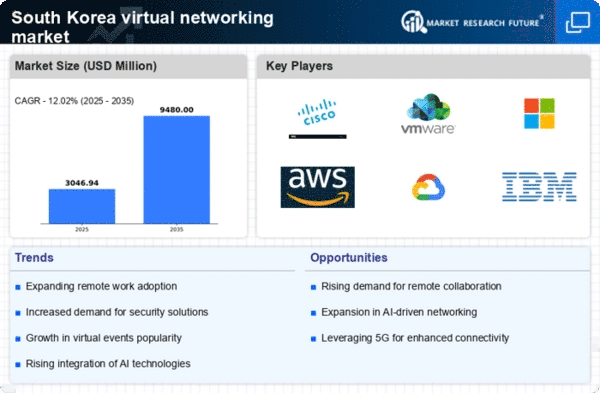Rising Demand for Remote Work Solutions
The virtual networking market in South Korea is experiencing a notable surge in demand for remote work solutions. As organizations increasingly adopt flexible work arrangements, the need for robust virtual networking tools has become paramount. According to recent data, approximately 70% of companies in South Korea have implemented remote work policies, driving the necessity for secure and efficient networking solutions. This trend is likely to continue, as businesses seek to enhance collaboration and productivity among remote teams. The virtual networking market industry is thus positioned to benefit from this shift, with companies investing in technologies that facilitate seamless communication and data sharing. Furthermore, the integration of advanced features such as video conferencing and real-time collaboration tools is expected to further propel market growth, as organizations strive to maintain operational efficiency in a remote work environment.
Increased Focus on Data Privacy Regulations
The virtual networking market in South Korea is also being shaped by an increased focus on data privacy regulations. With the implementation of stringent data protection laws, businesses are compelled to adopt secure networking solutions that comply with these regulations. The Personal Information Protection Act (PIPA) mandates organizations to ensure the confidentiality and integrity of personal data, which has led to a heightened demand for virtual networking tools that prioritize security. As a result, the virtual networking market industry is witnessing a shift towards solutions that offer enhanced encryption, secure access controls, and comprehensive monitoring capabilities. This regulatory environment not only drives innovation in security features but also encourages companies to invest in compliance-oriented networking solutions, thereby expanding the market.
Technological Advancements in Networking Solutions
Technological advancements are playing a crucial role in shaping the virtual networking market in South Korea. Innovations in networking technologies, such as software-defined networking (SDN) and network function virtualization (NFV), are enabling organizations to optimize their networking infrastructure. These advancements allow for greater flexibility, scalability, and efficiency in managing network resources. As businesses increasingly seek to enhance their operational capabilities, the virtual networking market industry is likely to benefit from the adoption of these cutting-edge technologies. Furthermore, the integration of artificial intelligence and machine learning into networking solutions is expected to improve network performance and security, thereby attracting more organizations to invest in virtual networking tools. This trend indicates a promising future for the market as it evolves to meet the demands of modern enterprises.
Government Initiatives Supporting Digital Transformation
In South Korea, government initiatives aimed at promoting digital transformation are significantly influencing the virtual networking market. The government has launched various programs to encourage the adoption of digital technologies across industries, which includes substantial investments in infrastructure development. For instance, the South Korean government allocated over $1 billion to enhance broadband connectivity and support the deployment of 5G networks. This investment is likely to facilitate the growth of the virtual networking market industry by providing the necessary infrastructure for high-speed connectivity. Additionally, the government's focus on fostering innovation and supporting startups in the tech sector may lead to the emergence of new players in the virtual networking space, further diversifying the market landscape and enhancing competition.
Growing Interest in Virtual Events and Online Communities
The rise of virtual events and online communities is another driver propelling the virtual networking market in South Korea. As organizations and individuals increasingly turn to digital platforms for networking and engagement, the demand for virtual networking solutions has surged. Recent surveys indicate that over 60% of businesses in South Korea have hosted virtual events in the past year, highlighting the growing reliance on digital channels for professional interactions. The virtual networking market industry is thus adapting to this trend by offering platforms that facilitate networking opportunities, such as webinars, virtual conferences, and online forums. This shift not only enhances accessibility for participants but also allows organizations to reach a broader audience, ultimately contributing to the growth of the market.
















